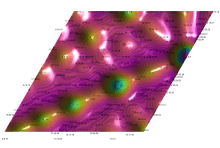Paul Erlich
- For the scientist, see Paul Ehrlich. For other uses, see Paul Ehrlich (disambiguation).

Paul Erlich (born 1972) is a guitarist and music theorist living near Boston, Massachusetts. He is known for his seminal role in developing the theory of regular temperaments, including being the first to discover pajara temperament[1][2] and its decatonic scales in 22-ET.[3] He holds a Bachelor of Science degree in physics from Yale University.
His invention of harmonic entropy[4] has received significant attention from music theorists such as William Sethares. It's intended to model one of the components of dissonance as a measure of the uncertainty of the virtual pitch ("missing fundamental") evoked by a set of two or more pitches. This measures how easy or difficult it is to fit the pitches into a single harmonic series. For example most listeners rank a 4:5:6:7 chord as far more consonant than 1/7:1/6:1/5:1/4. Both have exactly the same set of intervals between the notes but the first one is easy to fit into a single harmonic series. The other components of dissonance not modeled by this theory include critical band roughness as well as tonal context (e.g. an augmented second is more dissonant than a minor third although the interval, 300 cents, is the same for both).
References
- ↑ "Pajara". Xenharmonic.Wikispaces.com. Retrieved 2013-10-29.
- ↑ "Alternate Tunings Mailing List". Yahoo! Groups. Launch.groups.yahoo.com. Retrieved 2013-10-29.
- ↑ Erlich, Paul (1998). "Tuning, Tonality, and Twenty-Two-Tone Temperament". Xenharmonikôn 17.
- ↑ Sethares, William A. (2004). Tuning, Timbre, Spectrum, Scale. pp. 355–357.
Further reading
- Erlich, Paul. "Tuning, Tonality and 22-Tone Temperament." Xenharmonicon 17, 1998.
External links
- "Some music theory from Paul Erlich", Lumma.org.
- "A Middle Path: Between Just Intonation and the Equal Temperaments", Sethares.Engr.Wisc.edu.